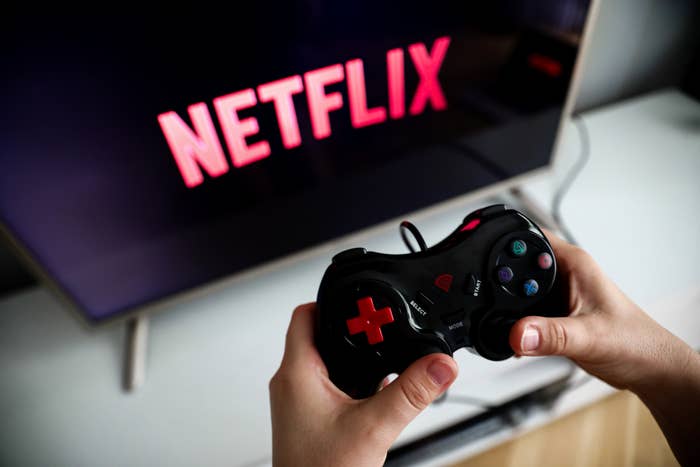
Following lackluster growth in the second quarter of 2021, Netflix recently announced that they would provide subscribers streaming access to video games free of charge as part of existing subscriptions. According to Variety, Netflix’s incredible growth during the pandemic seems to be waning, with a crucial 430,000 subscribers lost in Q2 in the company’s United States and Canada region.
Although speculation about Netflix making a foray into video games has been around for a bit, nothing had been made official until recently when it was announced that Mike Verdu (whose pedigree includes work with EA and Facebook’s Oculus) had been appointed vice president of game development. In a message to its shareholders, the company shared that the “time is right to learn more about how our members value games,”
The general response to Netflix’s announcement was mixed, with some users on Twitter praising the decision and others offering up a bit more skepticism. Even so, Netflix’s choice to branch out into other forms of streaming content definitely represents what could be the next frontier in both Cloud-based entertainment and the larger streaming wars.
So, what could Netflix offering video games to its users mean? How will other streaming services react? While Netflix hopes to offer games in the next year, according to an anonymous Bloomberg source, here’s a bit of speculation surrounding how the decision could play out for the streaming service and its competitors.
Cloud gaming isn’t a new idea; it’s just new to Netflix. In fact, one of the company’s biggest competitors in streaming, Amazon, already offers a Cloud-based game subscription service. Amazon’s Luna has been around via early access since October of 2020 and has yet to make many waves, despite offering users a variety of action, RPG, and FPS titles, including an exclusive partnership with Ubisoft. While the opportunity to play games like Assassin’s Creed and Far Cry definitely lends some street cred to Amazon’s Cloud gaming platform, it seems that many gamers would rather involve themselves in the console wars than the streaming wars.
With the basic membership to Luna priced at $5.99 a month, and the beta of Ubisoft+ adding $14.99 to the price tag, Amazon is asking for $240 a year (plus $50 for a controller) to enjoy its Cloud gaming service. While that price is less than a PlayStation 5 for the first year—not to mention easier to get your hands on—it’s hard to imagine someone with a PlayStation, Xbox, or the similarly priced Nintendo Switch choosing to check out Luna without more exciting exclusives to lure gamers.
Amazon’s not the only major company to struggle with Cloud gaming. Google, too, has had a rough go of it with its Cloud gaming platform, Stadia. Despite laying off every single one of its internal game developers, Google is still promising another 100 games for the platform in 2021. They’re also pushing a new model for revenue sharing in an attempt to woo new developers. Users of the service are currently estimated to be only about two million (compare that to PlayStation Network’s roughly 109 million monthly subscribers), and many believe the writing is on the wall for the service—even with this latest move for revenue sharing. While Google may figure out a path to resuscitation, it definitely seems like the introduction of any credible competitor, especially one with the name recognition Netflix has obtained, could take the Stadia off life support.
OK, so two huge companies have fumbled around with Cloud gaming, what makes Netflix the right company to stick the landing? For starters, Netflix has a reputation as a challenger capable of reinventing itself to great success. Lest you forget that Netflix was once a mail-based rental service for DVDs that went toe to toe with Blockbuster before becoming the de facto streaming service, Netflix definitely has the potential to successfully include gaming in a rebrand. Mike Verdu certainly seems to have the right background in innovative technology and major gaming publishers to bring a unique perspective to the challenge.
There’s also lots to be learned from where Amazon and Google have fallen short. The decision to bundle gaming as a separate genre in the app rather than charge for it alone would automatically mean that Netflix’s 208 million users could take advantage of the service right out of the gate. Particularly for online shooters, having a large player base and leaderboard is key, something Stadia and Luna can’t yet promise.
In a telling shareholder email, Netflix stated that their initial focus will be on “games for mobile devices.” What exactly the company means by that statement is still a bit up in the air, but if they choose to mimic some of the success of breakout social games like Among Us and The Jackbox Party Pack—rather than offering classic and contemporary cross-platform titles already available on next-gen consoles—their idea could certainly build a following.
What remains to be seen is whether or not existing users will choose gaming over bingeing the latest season of The Crown or Ozark or Bridgerton—and if gaming will bring new users to the platform. While time can only tell, it seems like Netflix has picked the right person to lead its gaming efforts, and their timing offers a lot of lessons from past attempts at Cloud gaming.
So, let’s say that Netflix successfully launches Cloud gaming in such a way that it becomes an attractive enough feature that other companies have to catch up. What then? Assuming that platforms like HBOMax, AppleTV+, and Disney+ can create the infrastructure to roll out gaming, the real winner would likely be the one with the best gaming IP.
Think about what likely made you subscribe to the existing services you already use to stream: exclusivity. You can’t watch Stranger Things or The Crown anywhere but on Netflix. If you want to catch up on the MCU with WandaVision, Loki, and The Falcon and the Winter Soldier you’re going to need Disney+. As Amazon’s decision to acquire MGM illustrates, the streaming wars are as much about what your competitors don’t have as they are about what you have. You can play Assassin’s Creed on Luna and Destiny 2 on Stadia, but those games are already cross-platform titles.
If Netflix can replicate the early success of shows like House of Cards by making a critically acclaimed splash rather than trotting out the same old indie titles you can play anywhere and a few retro arcade games, they may be on to something. That being said, if they do crack the code, they’ll have a steep hill to climb once rivals like Disney and HBO catch up by imitating their formula. As cool as another Stranger Things video game would be, it’s going to be hard to compete with the weight of new titles inspired by series like The Mandalorian and Game of Thrones. In fact, Disney+’s role as a family-centric entertainment platform and huge catalog of characters seem particularly well-poised to venture into the world of gaming.
Ultimately, it’s hard to predict how Netflix’s choice to include video games with its service will impact the streaming wars without more details about their plans. That being said, they have enough of a track record of success to expect that they could be the ones to really take this kind of streaming into the next generation. Although they’ll need to be wary of copycats, if they’re the first to launch a new branch successfully, the head start might give them some good momentum. For all the casual players, families, and gamers who still can’t get their hands on a PS5, let’s hope for the best.


